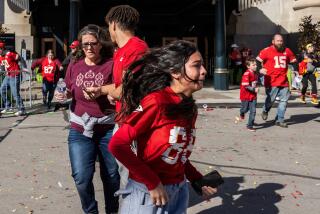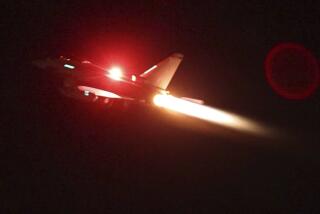A Matter for Debate: Was This a Terrorist Attack?
When is a crime a terrorist attack?
The conflicting language that legal scholars, Jewish and Muslim leaders and the federal government are using to describe Thursday’s airport shooting amounts to a post-9/11 updating of the late Supreme Court Justice Potter Stewart’s description of pornography: We know it when we see it.
The question of whether Hesham Mohamed Hadayet should be considered a deranged criminal or a terrorist fed a growing debate about whether America’s conventional definition of terrorism should be broadened.
For those on both sides, the event brought home to Los Angeles the semantic quagmire of the Middle Eastern conflict.
On one side, government officials--from the White House and the FBI to the mayor of Los Angeles--all took the role of cautious jurists and insisted that they lacked the evidence to label as terrorism Hadayet’s armed assault on the ticket counter of El Al Israel Airlines, the Israeli national airline.
On the other side, the Israeli government--echoed by some legal scholars, terrorism experts and Jewish leaders--was incredulous, arguing that such caution defied common sense and reflected a troubling lack of moral outrage.
“For the Israelis to immediately see this as an act of terrorism is understandable.... If you have a war mentality, then all acts are seen as part of the war,” said Brian Jenkins, senior advisor to the president of Rand Corp., who has been working on terrorism for more than 30 years.
Americans, on the other hand, live in a society where almost all victims of deadly violence die at the hands of an individual killer.
Nevertheless, for many Americans, the timing and the nature of the LAX shootings offered plenty of indications to the contrary.
What other conclusion, they asked, could be drawn from a Fourth of July attack at an airport long identified as a possible terrorist target, by an Egyptian-born man aiming at employees and customers of Israeli’s national airline?
Rebutting the U.S. government’s caution, these critics argued that, in the post-Sept. 11 climate, any act of violence in a public space could be sure to win notice on CNN--and thus be considered an act of terror.
“This guy must have known he was going to create a world event,” said Rabbi Marvin Hier, founder of the Simon Wiesenthal Center.
The use of the word terrorist is often believed to have begun during the French Revolution, when Jacobins who overthrew the monarchy called themselves terrorists. But the term, while widely used, has long proved difficult to define.
The first attempt by an international body to define terrorism was made in 1937 when the League of Nations called it “criminal acts directed against a state and intended or calculated to create a state of terror in the minds of particular persons, or a group of persons or the general public.” By the outbreak of World War II, only India had adopted the definition.
United Nations resolutions often condemn terrorism, but never define it. The U.S. government has seized on that ambiguity in the name of strategic flexibility.
American law defines terrorism differently, depending on whether the context is immigration, surveillance of foreigners or domestic prosecution. Both State and Justice Department guidelines on terrorism begin with the caveat that “there is no single universally accepted definition of terrorism.”
On Friday, both sides in the debate over the nature of Thursday’s shooting pointed to strikingly similar definitions of terror. FBI officials recited from the bureau’s 1999 publication, “Terrorism in the United States,” which calls it “unlawful use of force and violence against persons or property to intimidate or coerce a government, the civilian population, or any segment thereof in furtherance of political and social objectives.”
An Israeli government spokeswoman quoted from a recent speech by that country’s deputy prime minister, who called terrorism “killing and making attempts on the lives of innocent citizens to achieve political goals.”
According to the FBI’s own guidelines, “this looks like a terrorist attack,” said Meirav Shahar, Israeli consul for communications and public affairs in Los Angeles.
Richard Garcia, the FBI special agent in charge in Los Angeles, said the bureau had not found any indication of “anti-Israel views or any other type of racial views” that would match a classification of terrorism. He also allowed for the possibility that Hadayet had been “despondent for some reason in an abnormal reaction.”
To buttress its caution, the FBI seemed to ignore its own definition of terrorism in favor of a more limited State Department definition. That meaning holds that terrorism is perpetrated “by sub-national groups or clandestine agents.” FBI officials repeatedly emphasized Friday that Hadayet had no known connection with Islamic terrorist organizations.
A law enforcement official versed in counterterrorism said Friday that the LAX attack had all the markings of an isolated event rather than a well-planned conspiracy.
Both the gunman’s target and the manner in which he carried out the shooting indicated he was motivated by rage and had no help from others. Indeed, the official added, if the gunman’s motive was to strike at America or to instill fear among airport travelers, a much more logical target would have been any U.S. air carrier’s terminal.
“If this were Al Qaeda, they are going to go after an American airline, where the security isn’t as tight, because they don’t like America any more than they like Israel,” the official said.
But terrorism experts argued that such a definition is too limiting. “Part of what terrorism has become,” said Bruce Hoffman, author of the 1998 book “Inside Terrorism,” “is inspiring people to take matters into their own hands and act on their rage.”
Others wondered about the utility of such a debate. Terrorism is not, legally speaking, a federal crime with which a person can be charged. Murder and conspiracy statutes are used to prosecute alleged terrorists such as Zacarias Moussaoui, whom prosecutors believe was supposed to be the 20th hijacker on Sept. 11.
This quagmire makes it hard to decide even whether to have a formal definition of terrorism, said UCLA law professor Khaled Abou el Fadl. “Is it helpful, given that terrorism is such a politically charged word?”
More to Read
Sign up for Essential California
The most important California stories and recommendations in your inbox every morning.
You may occasionally receive promotional content from the Los Angeles Times.










